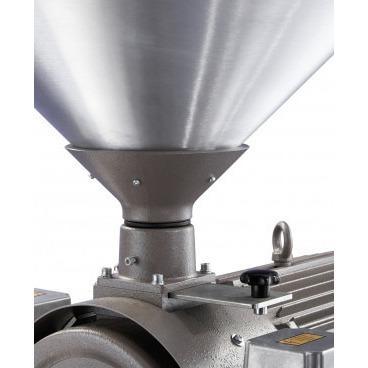Industrial Coffee Grinder vs. Personal Grinder: Key Differences Outlined
Industrial Coffee Grinder vs. Personal Grinder: Key Differences Outlined
Blog Article
Industrial Coffee Mill Guide: Boost Efficiency and High Quality
In the competitive landscape of coffee manufacturing, selecting the appropriate commercial coffee grinder plays an essential function in enhancing both performance and item high quality. Recognizing the nuances of different mill types and essential features-- such as adjustable grind setups and durable construction-- can dramatically influence the final flavor profile of the coffee.
Understanding Grinder Types
When picking a commercial coffee mill, understanding the numerous types readily available is essential for optimizing both flavor removal and operational efficiency. Both primary kinds of grinders are blade mills and burr mills. Blade mills use sharp blades that chop coffee beans right into inconsistent dimensions, resulting in irregular extraction and possibly unfavorable tastes. While blade grinders are typically more suitable and inexpensive for small operations, they are normally not suggested for commercial usage.

Ultimately, choosing the appropriate kind of grinder is integral to keeping high quality and effectiveness in coffee production, making it imperative for organizations to buy high-grade burr mills for optimal results.
Key Functions to Think About
Selecting an industrial coffee mill calls for mindful factor to consider of a number of crucial attributes that can dramatically influence both performance and the total coffee experience. One of the main facets to evaluate is the grinding device. Burr grinders are usually preferred over blade grinders, as they give a consistent grind size, which is crucial for optimum removal and flavor.
Another essential attribute is the grinder's ability. Relying on the quantity of coffee you require to process, choose a design that can handle your requirements without compromising rate or quality. Furthermore, consider the grind settings supplied. A flexible mill with several setups allows you to customize the grind size to different developing methods, improving the coffee's taste profile.
The building and construction material likewise plays a role in durability and upkeep. Stainless-steel components usually supply durability and are simpler to clean up, which is necessary for preserving hygiene requirements. Review the mill's noise level, specifically in a busy café or manufacturing environment, where excessive sound can be disruptive. Spending in a mill that balances these functions can significantly boost both operational performance and the high quality of the coffee served.
Optimizing Grinding Refine
To achieve the best results in coffee preparation, enhancing the grinding procedure is crucial. The grind dimension considerably affects removal, taste, and total top quality of the brewed coffee.


Furthermore, checking the grinding speed can enhance the procedure. Slower grinding typically generates much less warmth, maintaining fragile flavors and fragrances. Conversely, much faster grinding might create extreme warm, negatively impacting the coffee's top quality.
Maintenance and Treatment Tips
Appropriate maintenance and care of commercial coffee mills are important for making sure ideal performance and longevity. Regular cleansing is the structure of maintenance; deposit buildup can influence flavor and grinding performance. It is a good idea to cleanse the grinder after each usage, wiping down the exterior and removing any kind of coffee premises from the burrs.
Additionally, inspect the grinding burrs for deterioration. Boring burrs can compromise work uniformity, so they should be changed as essential. Industrial Coffee Grinder. Regularly calibrating the mill is likewise vital, as this maintains the desired grind dimension for different brewing approaches
Lubrication of relocating parts must be additional reading done according to the maker's specifications, as this reduces friction and prolongs the life of the equipment. It is necessary to utilize food-grade lubricating substances to make sure security and conformity with wellness guidelines.
Last but not least, keep the mill in a completely dry and steady setting to prevent corrosion and corrosion. By adhering to these maintenance and care tips, operators can improve the efficiency of their industrial coffee mills while making certain high-grade outcome and extended functional life.
Return on Financial Investment Analysis
Assessing the return on investment (ROI) for industrial coffee grinders is crucial for businesses looking for to optimize their coffee manufacturing abilities. A comprehensive ROI analysis aids establish the economic stability of investing in premium grinders, permitting companies to evaluate the first prices against possible gains.
Evaluate the purchase price of the mill, including installment and any type of necessary alterations to existing framework. High-performance grinders often lead to lowered grinding time and enhanced throughput, which can significantly boost efficiency.
Furthermore, take into consideration the effect on item high quality. Industrial Coffee Grinder. Superior grinders produce a more constant grind size, which can boost flavor accounts and customer satisfaction, inevitably driving sales. By boosting the high quality of the final item, companies can warrant higher prices, leading to raised revenue
Verdict
In summary, an industrial coffee grinder plays an essential function in improving both effectiveness and item quality within coffee production. Ultimately, the tactical investment in a reputable grinder contributes significantly to improved earnings and competition in the coffee market.
In the affordable landscape of coffee manufacturing, picking the appropriate commercial coffee grinder plays a pivotal duty in improving published here both effectiveness and product quality. The 2 key kinds of mills are blade mills and burr grinders. Within the burr grinder group, there are level burr grinders and conical burr mills, each with its benefits. Burr mills are typically preferred over blade grinders, as they offer a Home Page consistent work size, which is important for optimal removal and taste.
In summary, a commercial coffee mill plays a critical duty in improving both effectiveness and product top quality within coffee production.
Report this page